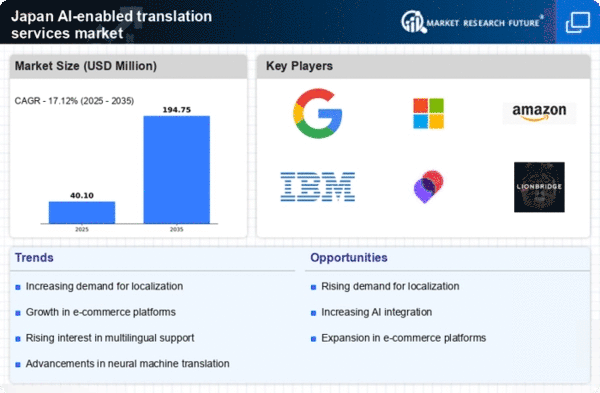Rising E-commerce Activities
The surge in e-commerce activities in Japan is a pivotal driver for the AI-enabled translation services market. As businesses expand their online presence, the need for multilingual support becomes increasingly critical. In 2025, Japan's e-commerce market is projected to reach approximately ¥20 trillion, indicating a robust growth trajectory. This growth necessitates effective communication across diverse languages to cater to a broader customer base. Consequently, companies are investing in ai enabled-translation-services to enhance user experience and facilitate seamless transactions. The ability to provide accurate translations in real-time can significantly impact customer satisfaction and retention, thereby driving demand for these services. As more businesses recognize the importance of reaching international markets, the ai enabled-translation-services market is likely to experience substantial growth, reflecting the evolving landscape of digital commerce in Japan.
Technological Advancements in AI
The rapid advancements in artificial intelligence technology are significantly influencing the AI-enabled translation services market. Innovations in natural language processing and machine learning are enhancing the accuracy and efficiency of translation services. In 2025, the market for AI technologies in Japan is expected to surpass ¥3 trillion, indicating a strong investment in AI-driven solutions. These technological improvements enable businesses to provide real-time translations, thereby improving customer engagement and satisfaction. As companies increasingly rely on AI to streamline operations, the demand for ai enabled-translation-services is likely to grow. Furthermore, the integration of AI with other technologies, such as voice recognition and augmented reality, presents new opportunities for translation services. This convergence of technologies may lead to the development of more sophisticated solutions, further propelling the growth of the ai enabled-translation-services market in Japan.
Cultural Exchange and Tourism Growth
Japan's rich cultural heritage and increasing tourism are driving factors for the AI-enabled translation services market. With the number of international visitors projected to reach 40 million by 2025, the need for effective communication in multiple languages is paramount. Tourists require accurate translations for various services, including hospitality, transportation, and local attractions. This growing demand for multilingual support encourages businesses to adopt ai enabled-translation-services to enhance visitor experiences. Moreover, cultural exchange programs and international events further amplify the necessity for translation services. As Japan positions itself as a global tourist destination, the ai enabled-translation-services market is likely to expand, catering to the diverse linguistic needs of travelers. The interplay between tourism and translation services underscores the importance of effective communication in fostering positive interactions between visitors and local communities.
Increased Focus on Localization Strategies
The growing emphasis on localization strategies among Japanese businesses is a crucial driver for the AI-enabled translation services market. Companies are recognizing that effective localization goes beyond mere translation; it involves adapting content to resonate with local cultures and preferences. As businesses aim to penetrate international markets, the demand for tailored translation services is likely to rise. In 2025, the localization services market in Japan is projected to reach ¥500 billion, reflecting the increasing investment in culturally relevant content. This trend encourages organizations to leverage ai enabled-translation-services to ensure that their messaging aligns with local expectations. By prioritizing localization, businesses can enhance their competitive edge and foster stronger connections with diverse audiences. The interplay between localization and translation services underscores the importance of cultural sensitivity in achieving successful market entry and expansion.
Government Initiatives for Digital Transformation
The Japanese government is actively promoting digital transformation across various sectors, which serves as a significant driver for the AI-enabled translation services market. Initiatives aimed at enhancing technological adoption and innovation are likely to create a conducive environment for the growth of translation services. For instance, the government's focus on improving communication in international business settings aligns with the increasing need for accurate translations. In 2025, government funding for digital initiatives is expected to exceed ¥1 trillion, further emphasizing the commitment to fostering technological advancements. This financial support may lead to increased collaboration between public and private sectors, thereby enhancing the capabilities of ai enabled-translation-services. As organizations seek to comply with government regulations and improve operational efficiency, the demand for these services is anticipated to rise, reflecting the broader trend of digital integration in Japan.
















